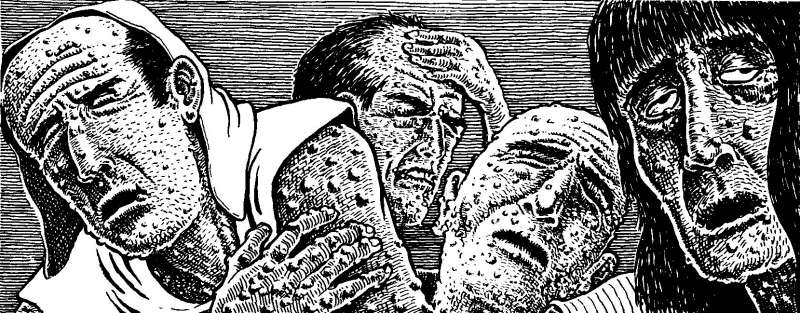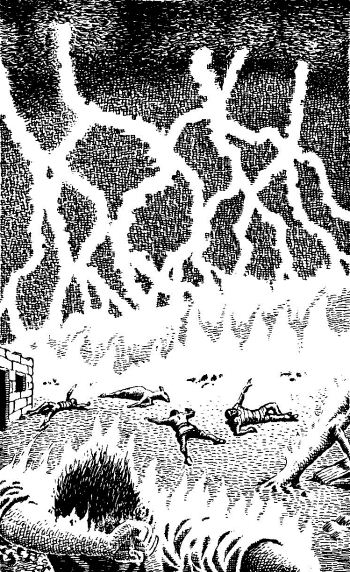PHARAOH had just started on a tour to view the livestock damage outside the city, when he was advised to turn back because an especially strong wind was driving the sand. At the same time the king saw two unwelcome but familiar figures carrying a large leather bag, standing on the palace steps.
Moses and Aaron Reappear
"What do you have there?" the curious and unfriendly king called out to the Israelites.
Moses and Aaron came closer to reveal the contents of the bag. "Ashes!" Pharaoh snorted. "How ridiculous!"
"Are they?" Aaron queried. "Would it mean anything to you that they are from the brick-drying kilns where our people have slaved so long?"
Without more words, Moses and Aaron dipped their hands into the bag and flung the tiny particles into the rising wind.
Boils!
Almost at once people living around Memphis, Egypt, broke out with painful boil-like blisters and sores. Minutes later those in more distant areas were overtaken with the same thing. Within hours all Egyptians became victims of the painful skin eruptions. The Israelites were the only ones in Egypt not afflicted. Even Pharaoh's magicians weren't spared, though the king futilely hoped they could help. The Bible account of this plague was the last time the magicians were mentioned. (Ex. 9-11)
When Pharaoh, who was among the first victims, recalled how the two Israelites had tossed the fine ashes into the wind, he realized that each ash particle touching skin obviously produced a skin eruption, of which he had his share. To worsen matters, much of the livestock rushed into Egypt to help replace some of the losses of animals during the last plague was downed by the skin affliction.

The Egyptians broke out in painful, fast-growing boils wherever the ashes touched their skins.
|
Because this was the kind of plague that pained the king both physically and appearance-wise, Pharaoh didn't delay for long an appeal for help to Moses and Aaron. He sent a messenger — obviously one who didn't have boils on his feet — to ask the two Israelites to come to the palace. Pharaoh didn't want to see them, but he needed relief. Besides, he was curious to learn what was going to happen after his next refusal to let the Israelites go. He didn't have to wait long, though the wait was painful.
"I know! I know! You are about to warn me of a new plague!" he growled as Moses and Aaron appeared. "But first get rid of this one!"
"Instead of mocking, you should be giving thanks that you're not dead," Aaron advised him as Moses nodded in agreement. "Our God has spared you only to continue letting you witness His great power. If you still refuse to let our people go, a terrible hailstorm will come on Egypt tomorrow, making your boils even more agonizing!" (Ex. 9-19)
"Hailstorms have occurred in Egypt before," the king observed, trying to appear painless as he tormentedly shifted his weight in his chair. "Small ice particles falling, surely will be endurable. Meanwhile, no Israelite has my permission to leave!"
|
Moses and Aaron weren't the only ones to hastily leave Pharaoh's court. Some of the Egyptians who had heard of the hailstorms to come were fearful of them, and hurried to try to get their property under cover. They warned friends to do likewise, and to seek shelter for themselves.
Hailstorm and Lightning
Later, on God's orders, Moses pointed his shepherd's rod toward a sky already darkening. Strong drafts of wind set the clouds boiling. Lightning flashed and shimmered through them. The roar and rumble of thunder threw the Egyptians into panic. Those in the open began to race for shelter from the expected down pouring of heavy rain.
But instead of rain came awesome bolts of fire. It cracked against the ground and hissed and sizzled off in all directions, scorching people, animals, shrubs, crops (except those still in the seed stage) and buildings. This was followed by huge hailstones smashing down on everything and snuffing out the lives of the unprotected. Only in the Goshen area of Egypt was there no lightning and hail.
In the smoking, rattling shelter of his palace Pharaoh shakily turned from a window to confront pale-faced Egyptian officials and servants. The accusing stares, the roaring bombardment, the vivid flashes of fire, the hideous rumble of thunder and the cries of people and animals in pain finally prevailed over the king's stubborn desire to hold the Israelites.
"Somebody must go after Moses and Aaron!" he shouted above the din, though he knew that anyone he sent probably couldn't survive the storm.
Almost miraculously the two Israelites shortly appeared, obviously protected by God from the frightful forces on their way to the palace. Pharaoh eagerly strode forward to meet them.
|

Bolts of flame hissed and cracked from
the low clouds, then shot along the
ground to sear everything they touched.
|
Pharaoh Weakens
"I and my people have been wrong!" the king exclaimed, generously sharing the blame. "Beg your God to stop this horrible storm! Your people will be free to leave Egypt at once!"
This was a far different Pharaoh from the one who had defied God a few hours before. Moses and Aaron could hardly believe that he had changed that much, but they were encouraged. Moses assured the king that the storm would cease after God had been asked to stop it, which Moses knew should be done without the presence of an Egyptian audience.
Pharaoh and his people were greatly relieved when the roar of fire and hail came to a halt. But as usual, as soon as matters improved, the king's stubbornness and hostility began to revive. Even while the dead were being carried away for burial, Pharaoh was deciding to do nothing to help the Israelites leave — which was according to God's plan.
Hours and days passed. Because of no word from the king, Moses and Aaron went to him to give him. another warning from God.
"You have broken your word again," he was reminded as he sourly regarded the two Israelites. "Unless you give the word for our people to leave right away, another misery will come to your land tomorrow."
As soon as Moses and Aaron had gone, Pharaoh's advisers crowded in to complain that the nation couldn't survive another plague. They were surprised to hear Pharaoh say that if they felt so strongly about the matter, they should see that Moses and Aaron would be brought back. Moses and Aaron were also surprised to be escorted back. Pharaoh then asked them how many of their people were expected to leave. He hoped only the women and children would have to go, so that he could keep the men working.
"All of us and our animals are to go," Moses answered.
"Then go!" Pharaoh exploded, angered by the reply. "But you'll regret leaving! You'll soon wish you had stayed in Egypt!"
Pharaoh was so enraged he had the two hustled out of his presence. Once they were in private, Moses pointed his shepherd's rod to the sky and asked God to bring another plague to Egypt. Immediately a wind sprang up. It increased in intensity as the night progressed.